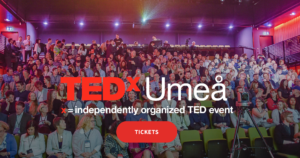 Markus have the honor of presenting some of our research on TedX Umeå. More precisely he will be talking about boredom on Everest, how that may kill and how they manage it –> and what ordinary organizations may learn from it. Find the information about Markus´s presentation below:
Markus have the honor of presenting some of our research on TedX Umeå. More precisely he will be talking about boredom on Everest, how that may kill and how they manage it –> and what ordinary organizations may learn from it. Find the information about Markus´s presentation below:
Information about the event, here
Managing the risk of boredom: Insights from Mt Everest
About me
I’m a professor in management at Umeå University, and genuinely curious about the impact of time and anything extreme in, and on society. I have researched extreme contexts such as mountaineering, emergency departments at hospitals and the police, and naturally published extensively in various journals. Together with my research team www.tripleED.com my latest project is concerned with the everyday activities in commercial mountaineering expeditions.
Why listen to me
I will bring you along to the roof of the world by elaborating on the dangers of being bored at Mount Everest, how commercial expeditions mitigate these risks, and how any organization may improve their business by learning from the insights gained in a setting where failure is not an option.
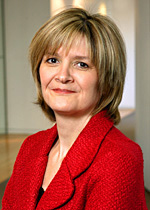 We have the pleasure of welcoming Professor Linda Rouleau (HEC Montreal and guest professor at USBE) to Umeå again. Linda, a long time member and collaborator of TripleED will together with Umeå faculty work on some papers related to Extreme contexts, and to Organizational routines. She will of course also provide her useful insights about research to the faculty in Umeå. Linda will be in Umeå 28/5-7/6.
We have the pleasure of welcoming Professor Linda Rouleau (HEC Montreal and guest professor at USBE) to Umeå again. Linda, a long time member and collaborator of TripleED will together with Umeå faculty work on some papers related to Extreme contexts, and to Organizational routines. She will of course also provide her useful insights about research to the faculty in Umeå. Linda will be in Umeå 28/5-7/6.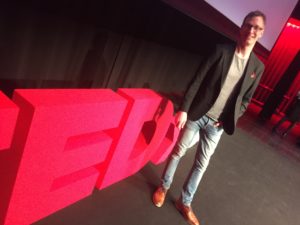 On May 3rd Markus presented some research from TripleED at TedX Umeå. It was a great experience and a well-done arrangement. The event was described as “For the fourth time, TEDxUmeå was held in the capital of Northern Sweden. As usual (since last year) with a +100 license and about 450 participants. Once again the team behind TEDxUmeå, a community that grows increasingly bigger each year, summoned a dozen speakers – from Umeå and the County of Västerbotten, as well as other parts of Sweden and Europe – eager to spread an idea they have, an obsession maybe, that truly are worth sharing.
On May 3rd Markus presented some research from TripleED at TedX Umeå. It was a great experience and a well-done arrangement. The event was described as “For the fourth time, TEDxUmeå was held in the capital of Northern Sweden. As usual (since last year) with a +100 license and about 450 participants. Once again the team behind TEDxUmeå, a community that grows increasingly bigger each year, summoned a dozen speakers – from Umeå and the County of Västerbotten, as well as other parts of Sweden and Europe – eager to spread an idea they have, an obsession maybe, that truly are worth sharing.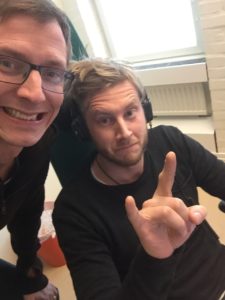 Today we received the great news that we received a small amount of funding (25000 kr) for visiting the Keswick museum that hosts the mountain heritage trust collection that relates to the history of (UK) mountaineering. We are really excited about this since we will be able to find some initial traces of how the history of mountaineering (and hence the commercialization of risk) has evolved through technical developments and undertakings. The data collection is planned for the fall of 2017.
Today we received the great news that we received a small amount of funding (25000 kr) for visiting the Keswick museum that hosts the mountain heritage trust collection that relates to the history of (UK) mountaineering. We are really excited about this since we will be able to find some initial traces of how the history of mountaineering (and hence the commercialization of risk) has evolved through technical developments and undertakings. The data collection is planned for the fall of 2017.
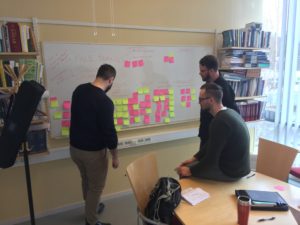 Here we are hard at work with the analysis of Robert´s first article where we examine sensegiving in the context of the Swedish police.
Here we are hard at work with the analysis of Robert´s first article where we examine sensegiving in the context of the Swedish police.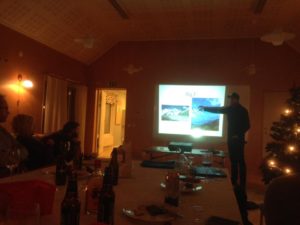 Björn has been holding two presentations about his Everest experience 2016. The first presentation was held during the annual Umeå Climbing club christmas dinner. In this presentation he talked about the research team, what we can learn from studying these kinds of extreme contextual settings and of course Everest as such. The second presentation was held for the department of Business administration where he shared some of his insights from collecting data and doing field work in extreme contexts.
Björn has been holding two presentations about his Everest experience 2016. The first presentation was held during the annual Umeå Climbing club christmas dinner. In this presentation he talked about the research team, what we can learn from studying these kinds of extreme contextual settings and of course Everest as such. The second presentation was held for the department of Business administration where he shared some of his insights from collecting data and doing field work in extreme contexts.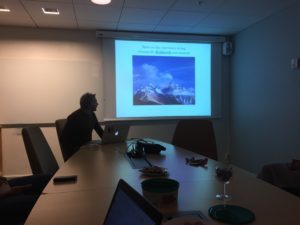
 For some time now Markus has been working on a podcast dedicated to learning from people involved in and with extreme contexts. The idea is to take seriously such individuals experiences and translate it to more ordinary settings and organisations. A plethora of different settings and themes will be covered but the first few episodes deals with high altitude mountaineering and how it may be applicable to i.e. project management. You find the podcast at
For some time now Markus has been working on a podcast dedicated to learning from people involved in and with extreme contexts. The idea is to take seriously such individuals experiences and translate it to more ordinary settings and organisations. A plethora of different settings and themes will be covered but the first few episodes deals with high altitude mountaineering and how it may be applicable to i.e. project management. You find the podcast at